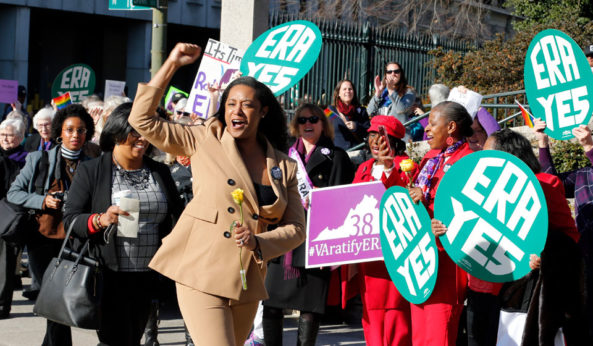
RICHMOND, Va.—On Tuesday, January 15, a big step was taken in the effort to make the proposed Equal Rights Amendment the 28th Amendment to the United States Constitution. The 98-year effort to get this amendment approved may, at last, be crowned with success.
By a large margin, 26 to 14, the 40-member Virginia State Senate voted to approve the amendment for the sixth time since 2011. There is a good chance that the House of Delegates, the lower house of the Virginia General Assembly, where the other five efforts to pass the measure failed, will follow suit, making Virginia the 38th state to ratify the amendment. If that happens, the requirement would be met that an amendment be passed by both houses of the U.S. Congress and ratified by the legislatures of three-quarters of the states (Illinois ratified the amendment just last year).

The “only” hurdle will be to get Congress to agree that the amendment process is now revived, after lying dormant, after the original ratification deadline expired in March 1979. There are different legal interpretations of the possibility of accomplishing this. But the amendment’s supporters are optimistic, due to the bipartisan “yes” vote on January 15, due to the advances the Democrats hope to make in state legislative elections this year, and to the large scale mobilizations for women’s rights nationwide. Right-wing anti-choice organizations tried to block the Senate actions but were thwarted when even some senators they considered to be their allies ended up voting “yes.”
Approval of the Equal Rights Amendment is only one piece of the ambitious legislative program progressive Democrats are advancing in the Virginia General Assembly this year. Another key measure was the restoration of the voting rights of felons who have finished serving their sentences. That measure, which would have helped to reverse Virginia’s historic disenfranchisement of lower income and minority working class people, was blocked in a Senate committee on a strictly party-line vote (eight Republicans against, six Democrats for), however. This means that felons can only get their voting rights restored by petitioning the governor, one by one.
The Democrats still hold out hope for the passage of some other progressive legislation in this session of the General Assembly. On Monday, January 14, the Senate Commerce and Labor Committee voted 8 to 6 to raise Virginia’s minimum wage, currently set at the federal minimum of $7.25 per hour, to $15.00 per hour by 2021. This advance was made possible by the decision of two Republicans to join the Democrats in voting “yes” on Senate Bill 1200.
Also on Monday, Del. Jennifer Carroll Foy (D-Woodbridge) and Sen. Jennifer Boysko (D-Herndon) introduced identical bills calling for the establishment of paid family and medical leave for Virginia workers, starting on January 1, 2022. Beneficiaries would be new parents, active duty military personnel, seriously ill people, and people who have to stay away from work to take care of seriously ill family members. At a Monday press conference in which she announced House Bill 2120, Foy said “Spending time with a dying relative, giving birth to a child, caring for a sick parent—these should not be privileges reserved just for wealthy Virginians” but should be available to all.
Currently, the Republicans have 21 votes in the Virginia State Senate to the Democrats’ 19, and 51 votes in the House of Delegates to the Democrats’ 48. One Northern Virginia House seat is currently vacant but will probably go to a Democrat in the coming special election. This year, all House and Senate seats are up for election, and the Democrats hope that the popularity of the measures they are introducing will allow them to win majorities in both houses in November.










